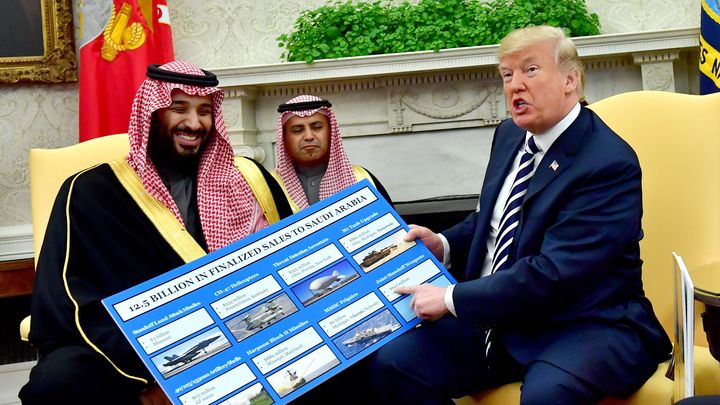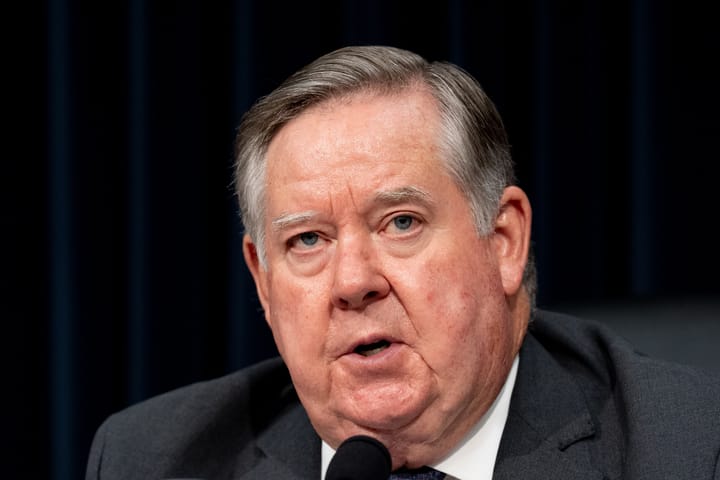President Trump isn’t the only one in Washington who wants to preserve the United States military’s relationship with Saudi Arabia. Lawmakers backed by defense industry contributions appear to feel the same way.
On Nov. 14, just days after reports of a recording linking Prince Mohammed bin Salman to the killing of journalist Jamal Khashoggi, the U.S. House of Representatives voted to deprivilege a resolution from Rep. Ro Khanna (D-Calif.) that would have halted U.S. military support for the Saudi Arabia-led coalition in the war in Yemen, effectively blocking the resolution from coming up for debate or a vote.
The representatives who voted to block Khanna’s resolution—primarily Republicans—received, on average, 75 percent more money from the defense industry during the last election cycle than the representatives who voted to keep the resolution privileged under the War Powers Act, according to a Sludge analysis of campaign contributions data compiled by the Center for Responsive Politics. The representatives who voted to deprivilege received $48,047 from the defense industry, on average, while the representatives who voted to keep it privileged received an average of $27,505.
By referencing the War Powers Act, Khanna’s resolution had a privileged status under House rules that required it to be automatically reported out of committee after 15 calendar days and then brought to the House floor for consideration within three calendar days. Last week’s vote stripped the resolution of that status, thereby allowing the Republican House leadership to ignore Khanna’s attempt to force a vote on the issue.
Defense contractors like Lockheed Martin and Raytheon sell billions of dollars worth of weapons to Saudi Arabia each year, a fact that Donald Trump highlighted—and exaggerated—in his Nov. 20 statement supporting the Saudis.
“After my heavily negotiated trip to Saudi Arabia last year, the Kingdom agreed to spend and invest $450 billion in the United States,” the President wrote. “Of the $450 billion, $110 billion will be spent on the purchase of military equipment from Boeing, Lockheed Martin, Raytheon and many other great U.S. defense contractors.”
The companies named by Trump are the same ones whose political action committees and senior employees have given large amounts of campaign contributions to the representatives who voted to deprivilege Khanna’s resolution.
Rep. Pete Sessions (R-Tex.), the Chairman of the House Rules Committee that created the rule stripping Khanna’s resolution of its privileged status, received $27,200 from Boeing this past cycle, more money than from all but three other campaign contributors. In 2016 and 2017 Boeing signed deals with Saudi Arabia worth more than $3.5 billion to sell them Chinook helicopters, guided weapons systems, and P-8 surveillance aircraft. Sessions also received $10,000 from Lockheed Martin, $7,500 from Northrop Grumman, and $5,400 from Raytheon.
Others who voted to deprivilege the resolution have taken even more money from these companies. Rep. Mac Thornberry (R-Tex.), for example, received $330,750 from the defense industry this cycle, more than any other representative. His total includes $36,900 from Raytheon, which has multi-billion dollar contracts to sell weapons to Saudi Arabia, including a $670 million contract for antitank missiles signed this year, plus $27,750 from BAE Systems, $25,640 from General Atomics, and $21,400 from Northrop Grumman, all major defense companies with business in Saudi Arabia.
The likely next House Appropriations Subcommittee on Defense chairman, Rep. Peter Visclosky (D-Ind.), who has received more defense industry money than any other Democrat, declined to cast a vote on deprivileging the resolution. Viscolsky’s top donor in the last cycle was Lockheed Martin, which gave him $49,800. Lockheed has several large contracts with the Saudis, including a pending deal to sell them $15 billion worth of its Theater High Altitude Area Defense (THAAD) missile defense system and another to sell them $11.25 billion worth of multi-mission surface combatant ships. As the head of defense appropriations, Viscolsky will have a major role in determining whether taxpayer dollars are allowed to go towards supporting the Saudi-led coalition’s air campaign in Yemen.
While’s Khanna’s bill would not block the defense companies’ sales to Saudi Arabia, it would end critical technical and logistical support by the U.S. military and could lead to fewer arms deals down the line.
“If Congress cuts off U.S. military assistance for Yemen, it will likely lay the groundwork for Congress to take further actions to block arm sales—such as a proactive suspension of arms sales,” said Kate Kizer, Policy Director with Win Without War, a nonprofit advocacy group.
In August, Sen. Chris Murphy (D-CT) introduced an amendment to prevent taxpayer dollars from being spent on Saudi Arabia’s military actions in Yemen, but it was blocked from receiving a vote by Sen. Richard Shelby (R-Ala.), the chair of the Senate Appropriations Committee. Shelby’s top campaign and leadership PAC contributors during his most recent election cycle, from 2011 to 2016, were Boeing ($103,544) and Lockheed Martin ($84,200).
Related:



